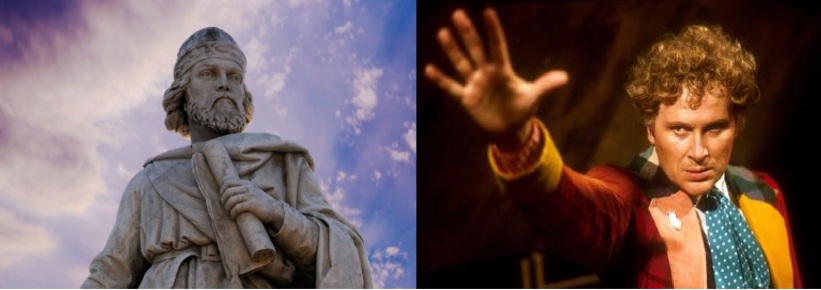The TARDIS occasionally found its way to early medieval England and these visits of the nation’s most beloved ‘Time Lord’ can also teach us something about Anglo-Saxon history and the Old English language. This post focuses on Alfred the Great and is the second of a series of three blogs that deal with the visits of BBC’s Doctor Who to Anglo-Saxon England.
The man who wouldn’t give up: The Doctor meets the King
In a volume of short stories entitled Doctor Who. Short trips: Past tense. A short-story anthology (ed. Ian Farrington, 2004), the contribution ‘The man who wouldn’t give up’, written by Nev Fountain, touches upon the most well-known king of the Anglo-Saxons: Alfred the Great (849-899). The story is an interesting mix of early medieval fact, Anglo-Saxon myth and Whovian silliness.

The year is 878 and the sixth Doctor lands in Somerset, where he enters the hut of a swineherd. Here, he chances upon Alfred, disguised as a Danish minstrel (a well-known but ahistorical myth); in a funny little twist, the Doctor introduces himself as a spying harpist who is investigating the Vikings: “Oh sorry, what am I saying? That’s not my story at all, it’s yours isn’t it? Your Majesty.” (p. 192) Alfred, rather surprised that this man has seen through his disguise, decides the Doctor must be a wizard. They then discuss the dire situation England is in (the Vikings have overrun almost all Anglo-Saxon kingdoms, only Wessex under Alfred remains, but even he has been forced to retreat to the Somerset marshes).
After their conversation is interrupted by Alfred’s severe stomach pain (a historical fact! I wrote a blog about this: Passion, Piles and a Pebble: What Ailed Alfred the Great?), Alfred sighs that he was never meant to be king:
“‘My father Ethelwulf died of his worries…’ the King continued in a flat emotionless drawl. ‘Ethelred…Ethelbald…All my older brothers… All have died fighting the Danish invaders before I became king. Five good men have had to lose their lives for me to stand here before you.’ (p. 194)
Indeed, Alfred had four older brothers, who all died before him: Æthelstan (d. c.852), Æthelbald (d. 860), Æthelberht (d. 865) and Æthelred (d. 871) (Note: it seems his father Æthelwulf (d. 858) had run out of Æthel- names once he got to Alfred – Alfred’s sister got lucky and was called Æthelswith). Naturally, the Sixth Doctor can relate to Alfred’s sentiment: “Really? Perhaps we’re not so different, after all.”
Apparently taking pity on Alfred, the Doctor convinces the king that, despite the setbacks he has suffered, the Vikings will eventually be defeated. Subsequently, the Doctor leaves, taking with him the swineherd’s cakes that Alfred was supposed to have been watching. Hilarity ensues. The wife of the swineherd returns and finds her precious cakes gone:
‘The cakes, you idiot. The cakes I expressly asked you to watch over.’
He looked. The cakes had gone.
‘The wizard! He took the bloody cakes!’
‘What wizard?’ (p. 196)
Unable to find the Doctor, Alfred pretends that he has burned the cakes. So that’s where that story came from!
They think it’s all over: Doctor Who at Wemba’s lea
Alfred also gets a mention in the comic book story ‘They think it’s all over’, published in Doctor Who #5 (2011). This time, the eleventh Doctor and his companions Rory and Amy want to visit Wembley Stadium in 1996, to watch England play Germany in a football match. The TARDIS lands in the right place, but at the wrong time: the ninth century, when Wembley was not called Wembley, but Wemba’s lea. They are taken prisoner by Saxon warriors who mistake them for Danish trespassers:

As the Doctor explains, the name Wembley actually comes from the Old English word lēah ‘clearing in a forest’, combined with the personal name Wemba; it is the clearing that belongs to Wemba. Wembley, by no means, is the only modern place name to derive from the word lēah, as the following list illustrates:
- Wembley < ‘clearing of Wemba’
- Dudley < ‘clearing of Dudda’
- Oakley < ‘clearing with oaks’
- Stanley < ‘clearing with stones’
- Gatley < ‘clearing with goats’
- Beeley < ‘clearing with bees’
- Batley < clearing with bats’
- Crawley < ‘clearing with crows’
- Shipley < ‘clearing with sheep’
Note how these place names can tell us a lot about the surrounding flora and fauna in the early Middle Ages!
Anyway, the Doctor and his companions are brought before Wemba himself, who relates that he has heard of a strange man in a blue police box before, from Alfred the Great himself:

(The Doctor’s remark about Alfred’s culinary skill is a little below the belt, seeing as it was the Doctor himself who stole the cakes, as we saw before)
After the Doctor and his companions have been released and partake in an Anglo-Saxon feast, the meeting is disturbed by a group of Vikings, who end up taking Amy hostage. In order to win her back, the Doctor and Rory then challenge the Vikings to a penalty shoot out, which they win. With the Vikings defeated, Wemba is overjoyed, noting: “King Alfred was right about you! You truly are a wizard!” (indeed, Alfred regarded the Doctor as a wizard, see above). Finally, the Doctor and his companions go to the year 1996 and attend the game, shouting “Wemba’s Lea, Wemba’s Lea!” (and you now know why).
This was the second of a series of blogs on Doctor Who in Anglo-Saxon England, you can read the first part here: Lǣce Hwā: Doctor Who in Anglo-Saxon England. The third and final part is available here: Lǣce Hwā: Doctor Who and the Norman Conquest.

Reblogged this on Same things, sideways.
LikeLike